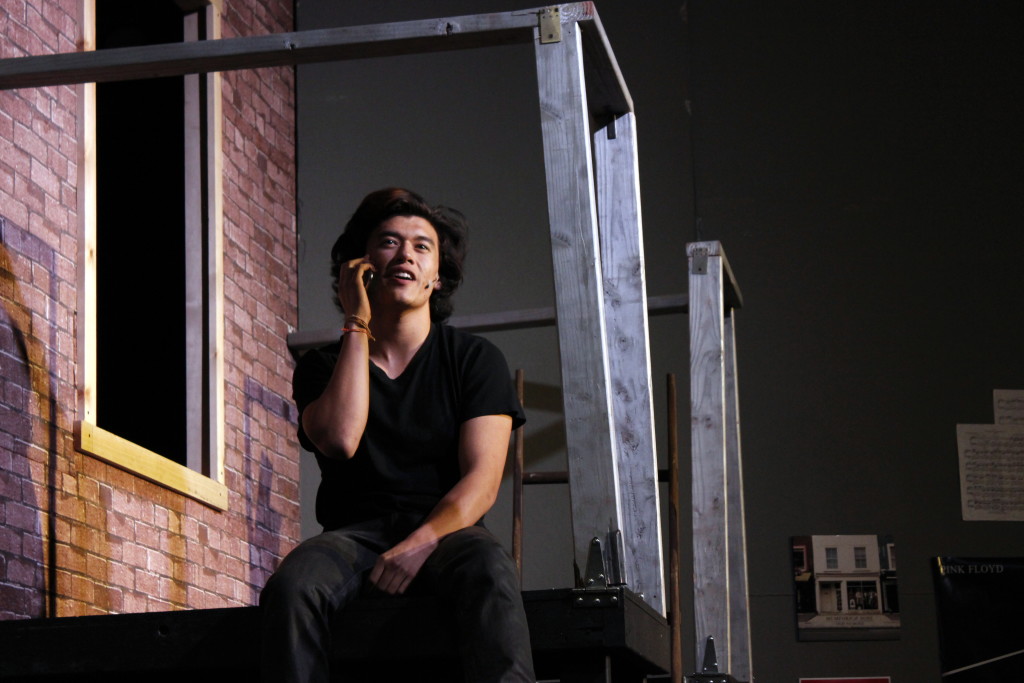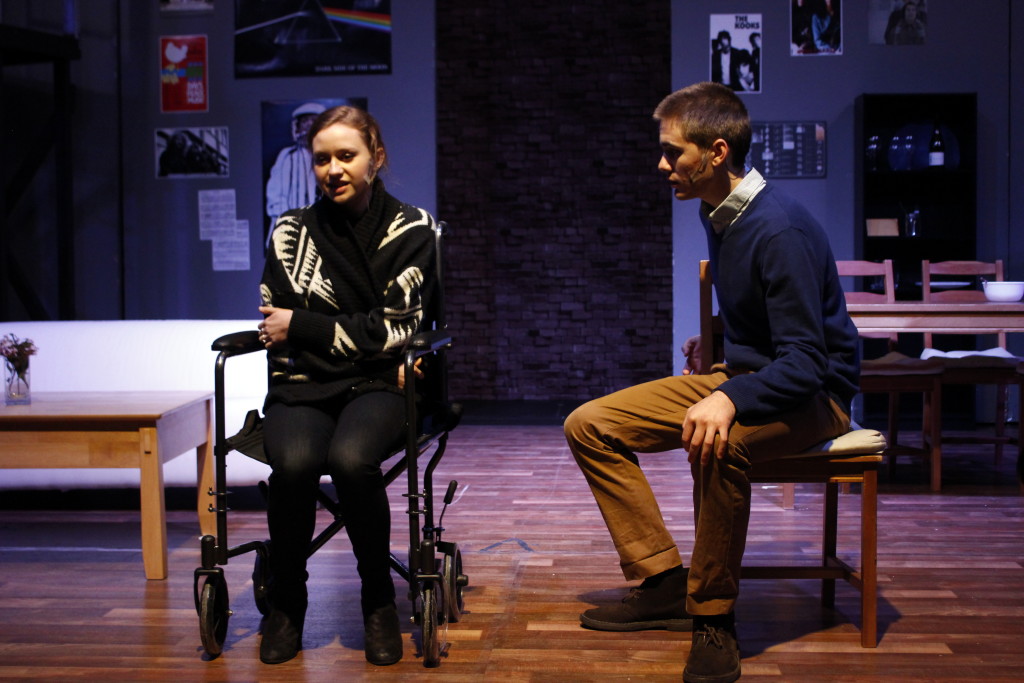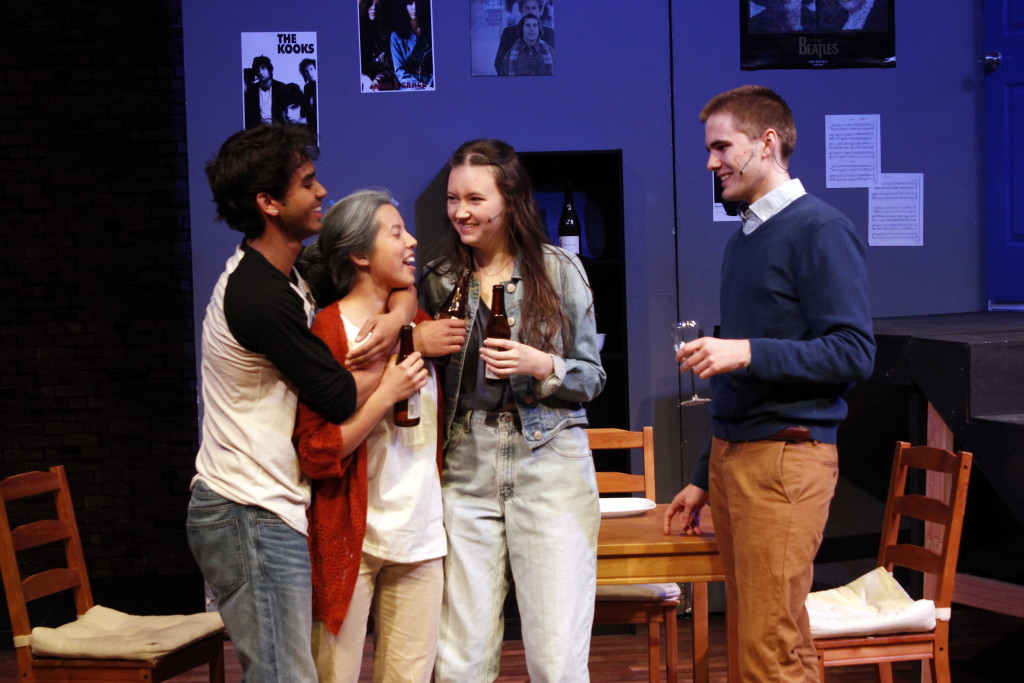
When Mirror Image, the original musical by senior Louis Lagalante and junior Patty Hamilton, goes up tonight at Dinkelspiel Auditorium, the student audience might very well recognize themselves in the show. Or at least, if they don’t recognize themselves in their current, secure-at-Stanford, optimistic-for-everything incarnations, they’ll see their deepest anxieties about the future playing out before them. And it’ll all seem uncannily familiar, even if it’s expressed by means of a generous array of musical numbers.
The show follows the lives of three close friends, or rather it picks up two particular moments in these friends’ lives, ten years apart, and places them directly beside (and sometimes on top of) each other. We meet our trio at the fresh age of 21, just as dreams are about to come true: David and Keira are about to get married, and David and Mike, an aspiring singer/songwriter duo, get offered a contract that promises to whisk them away to LA and into preeminent rockstardom. Everything seems to be going right; the sun is shining; high-waisted jeans are in. We are lured, in the uptempo opening number, into expecting a linear narrative tale about the manifest destiny of creative dreams.
But the story then shifts abruptly— to our same three friends, in the same apartment, ten years later. Mike is visiting after a long time away, having become a solo superstar; David and Keira, now many years into their marriage, are tense and their every word drips with profound domestic discontent. The overwhelming feeling of resignation— of stagnation and general stuckness— is all the more powerful because of the sharp contrast it poses to their younger selves, and the lack of explanation of how that glimmering 21-year-old’s world turned into this.
That disconcerting feeling, which connects the two parallel time zones while narrative explanation is purposefully withheld, is fully embodied in the show’s main character, David. A whimsical singer/songwriter in the past and a disgruntled husband in the present, David occupies that fretful space throughout the play, his own creative and interpersonal Purgatory.
The musical unfolds the action of those intervening eight years slowly, revealing the causal relationships between the two parallel moments as they make dramatic sense, rather than linear. The cast is divided along this temporal line, with Jace Casey and Kathleen Kelso portraying Young Mike and Young Kiera, respectively, and Alex Kim and Ellen Woods giving life to their older counterparts in the present day. Lundquist alone portrays both his character’s past and current selves, giving visible representation to David’s internal anxiety in reconciling the two.

Helpfully equipped with the voice of an angel, Lundquist convincingly carries the weight of those intervening years on his sweater-vested shoulders. David is simultaneously pulled by the past and the present, fully cognizant of the immense gap between his old imaginings of the future and its ultimate realization, yet uncertain how to best proceed while honoring what he has lost.
“At its heart, this is a story about three kinds of loss— of family and friendship, or love, and of dreams,” explained director Hamilton. Each of the three characters begins with a clear vision of the dream he or she wants more than anything else in the world, and the unforeseen obstacles of growing up force them to reevaluate those dreams, formed in their starry-eyed youths. David is constantly at a loss for how to acknowledge the pain of the past while pursuing the dreams of the present.
If David’s internal struggle were as straightforward as that, this show might be boring or simplistic. But his qualms are much more realistically ambivalent, more true to the reality that people rarely have one clear-cut goal that no outside influences could possibly sway or deter. There tends to be more nuance to our driving desires than cleanly cut stories can adequately capture. What if we grow out of the dreams we once wanted? What if we decide we want something more than another? What if something that once was a goal in itself becomes less an objective and more a side passion? Is that still giving up?
The accurate messiness of the characters, fully fleshed out and developed on both ends of a decade, would probably be more difficult to grasp if not assisted by the musical theatre aspect of the story. The song lyrics are inherently straightforward, offering us a glimpse into the characters’ psyches that we may not be able to parse out elsewhere, especially with the parallel temporal lives and characters jumping in and out of proper time, interacting across memory and unrealized dreams. Lagalante’s original lyrics are eloquent and enjoyable all on their own, and they’re made especially poignant by the fact that they speak to the specific characterization of David, who struggles to express himself outside of his songwriting.
The entire show is the brainchild of Lagalante. Nearly two years ago, he wrote the title song, Mirror Image, about his own writer’s block; he later realized that there was a story here, the progression of a man whose journey would culminate in that song. Rooted in this beginning, and brought to life through the massive collaboration of so many different Stanford artists and areas and expertise, the final production retains that original authenticity while also reflecting a great deal about the broader college environment that fostered it.

Mirror Image embodies many of the anxieties that college students have, especially the ones who dabble in the arts and have dreams about Hollywood or New York— dreams that seemed shiny and unshakeable in high school but now, on the precipice of leaving our extracurricular paradise for the real world, look daunting. It seems that at any moment they will either harden into the real, or dissipate into an unrealized memory; there is no in-between dreamland anymore.
The ways we approach that impending challenge— and the openness we have to embracing the new dreams that inevitably develop— are both revealing and consequential. They determine how much we like the person looking back at us in the mirror.
Mirror Image: 7:30 p.m. Thursday & Saturday; 11:59 p.m. Friday. Dinkelspiel Auditorium. Tickets at stanford.io/mirrorimagemusical.
Photo credits: Keegan Livermore
